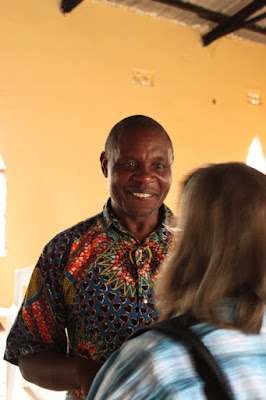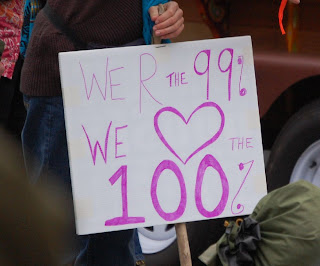Dear friends,
This has been a year of major
transition and growth for me. Some of the change has been personal -
such as my involvement in the Occupy movement, and Faith's and my
decision to purchase a house in DC. Other change has been more
corporate, such as the increasing maturation of Capitol
Hill Friends, and developments within Rockingham Meeting,
Stillwater Quarterly Meeting, and Ohio Yearly Meeting as a whole. For
me, 2011 was a year of reality checks. At many points, I have been
brought low. I pray that these experiences will produce a lasting
groundedness in me.
 The big adventure this year was my
summer travels to England, Kenya and Rwanda. The voyage began with a
week-long layover in London, which allowed me to visit a number of
British Friends connected with Ohio Yearly Meeting, as well as some
others whom I knew through the 2010 Quaker Youth Pilgrimage. I
believe that these opportunities were a blessing both for me and for
those who welcomed me, and I was grateful for the chance to become
better acquainted with the context of Friends in the UK.
The big adventure this year was my
summer travels to England, Kenya and Rwanda. The voyage began with a
week-long layover in London, which allowed me to visit a number of
British Friends connected with Ohio Yearly Meeting, as well as some
others whom I knew through the 2010 Quaker Youth Pilgrimage. I
believe that these opportunities were a blessing both for me and for
those who welcomed me, and I was grateful for the chance to become
better acquainted with the context of Friends in the UK.
Following this, I joined my colleagues
from ESR on a tour through East Africa. We saw Nairobi, went on
safari, and visited Friends in Kenya's Western Provence. Then, we
flew to Rwanda, where we were able to meet Friends from Rwanda Yearly
Meeting. I was very impressed with the faith of African Quakers, and
saw how Friends there hold many pieces of the radical Quaker faith
that we in the United States often miss.
At the same time, I witnessed some of
the effects that poverty and a history of colonialism have had on our
African brothers and sisters. Above all, I was convicted of my own
society's ingratitude for the wealth and privilege that we possess.
How do we as citizens of post-colonialist nations take responsibility
for our luxury, which to a great extent has been purchased with the
blood of non-European peoples? This is a question first and foremost
for the Church, which claims faith in Jesus Christ, who proclaimed
good news to the poor and freedom to the oppressed.
I brought these concerns back home to
DC, realizing that our spiritual barrenness in the developed world is
perhaps an even greater burden than the material poverty of those in
the global south. Together with Friends at Capitol Hill Friends, I
feel called to be a light in the darkness, an embodiment of Christ's
love in a culture that has largely turned away from him.
A big part of this calling has found
expression through the continued development of Capitol Hill Friends.
In February, we had a major shake up when two of our five core people
felt the need - for a variety of reasons - to withdraw from the
community. This was a major blow, which knocked the wind out of us
for a little while. It forced the three remaining core people to get
even more serious about the direction our group was headed in. It was
at about this time that we made the decision to switch our worship
time from the 2nd and 4th Wednesday evenings to Sunday nights.
Along with a new meeting time, we also
began to gather much more regularly as a core group. Starting in the
fall, the core group has been meeting once or twice a month for
prayer, discernment, decision-making and mutual support. As the year
went on, we became clear that Capitol Hill Friends is actually a
little church, not just a worship opportunity. We recorded three
members, and incorporated Capitol Hill Friends as a legal entity. In
the fall, Lily Rockwell of Stillwater Monthly Meeting (Ohio Yearly
Meeting) came and joined us as a sojourning member of our fellowship.
She has been invaluable in helping to nurture the church, and we are
very grateful for God having sent her to us.
At this point, Capitol Hill Friends has
three regular members, one sojourning member, and approximately a
dozen attenders. Our normal attendance on Sunday nights is about
eight. While these are not huge numbers, we have experienced a
remarkable shift from 2010, when Capitol Hill Friends was primarily a
worship opportunity but had no real core or sense of identity. Now,
Capitol Hill Friends is an independent church in the Quaker
tradition, albeit a small one.
As such a tiny group, relationships
with a wider fellowship of believers is crucial. We have found most
support in our relationship with New City Friends, another new Quaker
church in Detroit, Michigan. Late last year, we adopted a shared set
of Advices and Queries with them, and each of our communities has
been answering them on a monthly basis. Also, we met twice this year
for joint retreats; the first taking place in Washington, DC in
April, and the second occuring in Detroit, in November.
At our November meeting, Friends from
New City Friends and Capitol Hill Friends felt clear to continue to
deepen our relationship as an extended fellowship. We agreed to make
slight revisions to our Queries (to render them more straightforward
to answer), and we were in unity to hold two joint retreats in 2012.
The exact dates have not yet been set, but we plan to gather together
in a central location in the spring and early fall. We hope that
other Friends, worship groups and Meetings of like mind will join
with us and explore what it means to live a faith of radical
discipleship to Christ Jesus in the early 21st century.
 There is, however, a sad subtext to
these exciting developments. I feel very pleased with the growth in
relationship between New City Friends, Capitol Hill Friends, and
others Friends of like mind; and I believe that this new association
has the potential to offer a vibrant alternative for Friends in North
America. However, we had hoped that we would not be forced to go
independent.
There is, however, a sad subtext to
these exciting developments. I feel very pleased with the growth in
relationship between New City Friends, Capitol Hill Friends, and
others Friends of like mind; and I believe that this new association
has the potential to offer a vibrant alternative for Friends in North
America. However, we had hoped that we would not be forced to go
independent.
Both New City Friends and Capitol Hill
Friends were turned away by pre-existing Friends bodies. Some Friends
are uncomfortable with our uncompromising commitment to shared
Christian faith. Others are put off by our clear affirmation of our
gay, lesbian and transgender brothers and sisters. Despite our best
attempts, there seems to be no existing body that has room for all of
who we are. This has been a source of great sadness for us; however,
we must be faithful to the witness of the Holy Spirit in our midst,
even if our sister Yearly Meetings cannot embrace us.
Please pray for Capitol Hill Friends,
New City Friends, and for the many Friends today that find nowhere to
fit in within existing Yearly Meetings. Pray that God will strengthen
us in our faith and in our fellowship, and that the Spirit will draw
together other individuals and groups who are being called into this
new thing that Christ is doing today.
Before I conclude, I cannot fail to
mention the immense impact that the Occupy movement has had on me
these last few months. I got involved early in this movement, because
I felt the Lord's hand on me, urging me forward. I was in New York
during the second week of Occupy Wall Street, and I was one of the
original organizers of Occupy DC. Now, I feel that the movement has
reached a turning point. Phase one is over, and something new must
emerge for us to continue to have an impact. I do not know what
exactly this next phase will look like, but I am praying that it
might have the effect of empowering ordinary working Americans to
re-assert their rights and responsibilities as citizens, taking power
back from the corporations and monied interests that have so
undermined our democracy.
The experience of being and organizer
for the Occupy movement has changed me. During college, I became
totally disillusioned with activism, and since that time have not
thought of myself in those terms. It was a great surprise when I
sensed God calling me to participate in this movement. Much more so
when I realized that God was leading me to be one of the main people
to get things going in DC!
This movement has radicalized me. I can
no longer sit on the sidelines while billionaires and their servants
transform our democracy into a corporate state. I can no longer keep
silent while the rich grow richer at the expense of the most
vulnerable. I can no longer maintain neutrality while the middle
class is obliterated. In recent months, I have been awakened to the
radical implications of Jesus' jubilee proclamation(1). I must stand
with the poor and oppressed. I must witness to the damage being done
to women and men - and to the whole of creation - to satisfy our
greed and idolatry. I can no longer preach a spiritualized gospel,
reduced to personal spiritual growth. God's justice and salvation
must be embodied among the poor, in our prisons, in the oil-soaked
Gulf of Mexico, and in the halls of power.
Thank you for walking beside me in this
journey. This year has been a wild ride, and I have no doubt that
2012 will be at least as full of surprises. Just before Faith and I
left DC for the holidays, we bought our
first house, located in Northeast DC. Please pray that we be
blessed in our new home; and for our life together as we deepen our
commitment to our city, our church and our extended community of
friends.
Your friend in Truth,
Micah Bales
-
1. See Luke 4:14-28













































